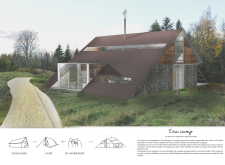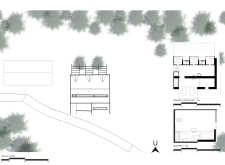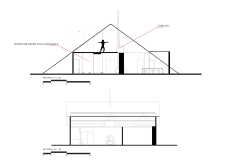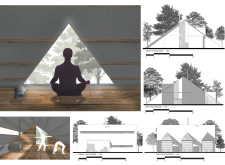5 key facts about this project
Tea Camp is located in Ozolini, Latvia, and serves as a guest house for those interested in tea-making. The design takes inspiration from camping, a popular activity that brings people closer to nature. The architecture reflects a tent-like shape, which not only provides shelter but also invites guests to engage with the surrounding environment. This connection to the outdoors is a central theme, promoting a sense of community and simplicity.
Form and Function
The structure's form closely resembles a traditional camping tent. This design choice helps create a welcoming atmosphere while addressing practical needs. The shape allows for an efficient layout that can accommodate visitors comfortably. With this design, the building becomes an extension of the natural environment, encouraging exploration and interaction.
Natural Lighting
Natural light plays a crucial role in the overall experience at Tea Camp. Large openings fill interior spaces with daylight, creating a warm and inviting atmosphere. This emphasis on light enhances the connection between indoor areas and the outside world. The resulting brightness fosters a sense of tranquility and relaxation for all who stay.
Material Usage
Wood is the primary material used for the interior walls. This choice adds warmth and a tactile quality to the space, offering comfort reminiscent of outdoor camping. The use of wood not only enhances the aesthetic appeal but also reinforces the theme of simplicity. A furnace is included, providing necessary warmth and echoing the shared experience of gathering around a campfire.
Spatial Configuration
The layout of Tea Camp encourages movement and interaction among guests. Open spaces allow for easy navigation throughout the building. This design helps bring people together and cultivates a sense of community, much like the traditional outdoor experiences that inspired it. By removing physical barriers, the space invites conversations and shared moments.
The overall design emphasizes a balance between comfort and a connection to nature. Each element works together to create a unique experience where visitors can enjoy the peacefulness of their surroundings.























































